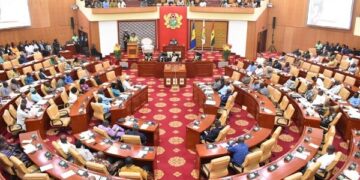Fighting has continued on the fifth day of Russia’s invasion of Ukraine, despite talks aimed at securing a ceasefire.
Missile strikes killed dozens of civilians in the country’s second city, Kharkiv, while air raid sirens sounded again in the capital, Kyiv.
There were reports of fierce shelling in the northern city of Chernihiv.
Russia is attacking Ukraine on several fronts, but its advance has been slowed by Ukrainian resistance.
All three cities remain under Ukrainian control.
Away from the battlefields, economic and diplomatic moves have continued.
President Vladimir Putin has banned Russians from moving money abroad as he tries to halt a plunge in the value of the rouble following the imposition of sanctions.
And a rare emergency session of the United Nations General Assembly has heard a demand from the secretary general for an immediate halt to hostilities.
Meanwhile, on the northern border with Belarus, Ukrainian and Russian officials ended their first round of talks.
There was little expectation the session would bring a breakthrough, but a Ukrainian official said both sides would now return to their respective capitals for further consultations before a second round of negotiations.
Russia said both sides had agreed to continue talking and would meet again “in the next few days”.
Videos shared on social media showed rockets landing in Kharkiv, in what some defence analysts described as typical of a cluster munition strike on a dense urban area.
Attempts have been made to impose a global ban on cluster munitions, with 110 nations agreeing to outlaw them under a 2008 convention. However, neither Russia nor Ukraine have signed it.
Human rights group Amnesty International has accused Russia of indiscriminate use of weaponry on populated areas, something it said could constitute a war crime.
Russia has previously denied targeting residential areas.
In Kyiv, the bulk of Russian forces are about 30km (19 miles) outside the north of the city, slowed by fierce Ukrainian resistance, according to the UK Ministry of Defence.
But reports of fresh fighting on the outskirts of the capital forced residents back into their shelters on Monday evening.
The cities of Kharkiv and Chernihiv faced heavy shelling on the fifth day of Russia’s invasion
Another video circulating on social media showed huge clouds of smoke at a burning shopping centre in Chernihiv, another city that has been under pressure from the Russian offensive.
One teacher in Chernihiv, Oksana Buryak, told the BBC the situation was “like from some horror movie”.
“Our hearts are broken, we don’t understand anything,” she said.
“For the fifth day, we, my country, my town, my family, my parents and my brother, my beloved son are living with fear in inhumane conditions.”
Watch: Liza Grach emotionally describes fleeing Ukraine with her 10-month-old baby, but leaving her husband behind
To the south, Russian forces are trying to take control of the key strategic port of Mariupol, near Russia-annexed Crimea. Ukraine denied reports that Zaporizhzhia, home to Europe’s largest nuclear power plant, had fallen into Russia hands.
Ukrainian Interior Minister Denys Monastyrskyy, speaking to the BBC, said the situation across the country was “serious, but stable”.
“Every day the enemy sends more and more forces. But our glorious armed forces are basically destroying everything that arrives to Kyiv. Kyiv remains the place of the main strike,” he added.
“We are creating mobile groups to search and catch saboteurs. We have up to 100 such groups active in Kyiv, depending on the time of day.”
The UN human rights chief, Michelle Bachelet, said millions of civilians were being forced to huddle in makeshift bomb shelters such as underground rail stations to escape explosions.
Since the invasion began on Thursday, her office has recorded 102 civilian deaths, including seven children – and more than 300 injured.
“The real figures are, I fear, considerably higher,” she said.
Source: BBC
Over 14,000 girls impregnated in Bono Region between 2021 and 2024
The Bono Region recorded 14,877 teenage pregnancies from 2021 to 2024, Miss Rita Adjoa Ansong, the Deputy Director of Nursing...
Read moreDetails


















































































